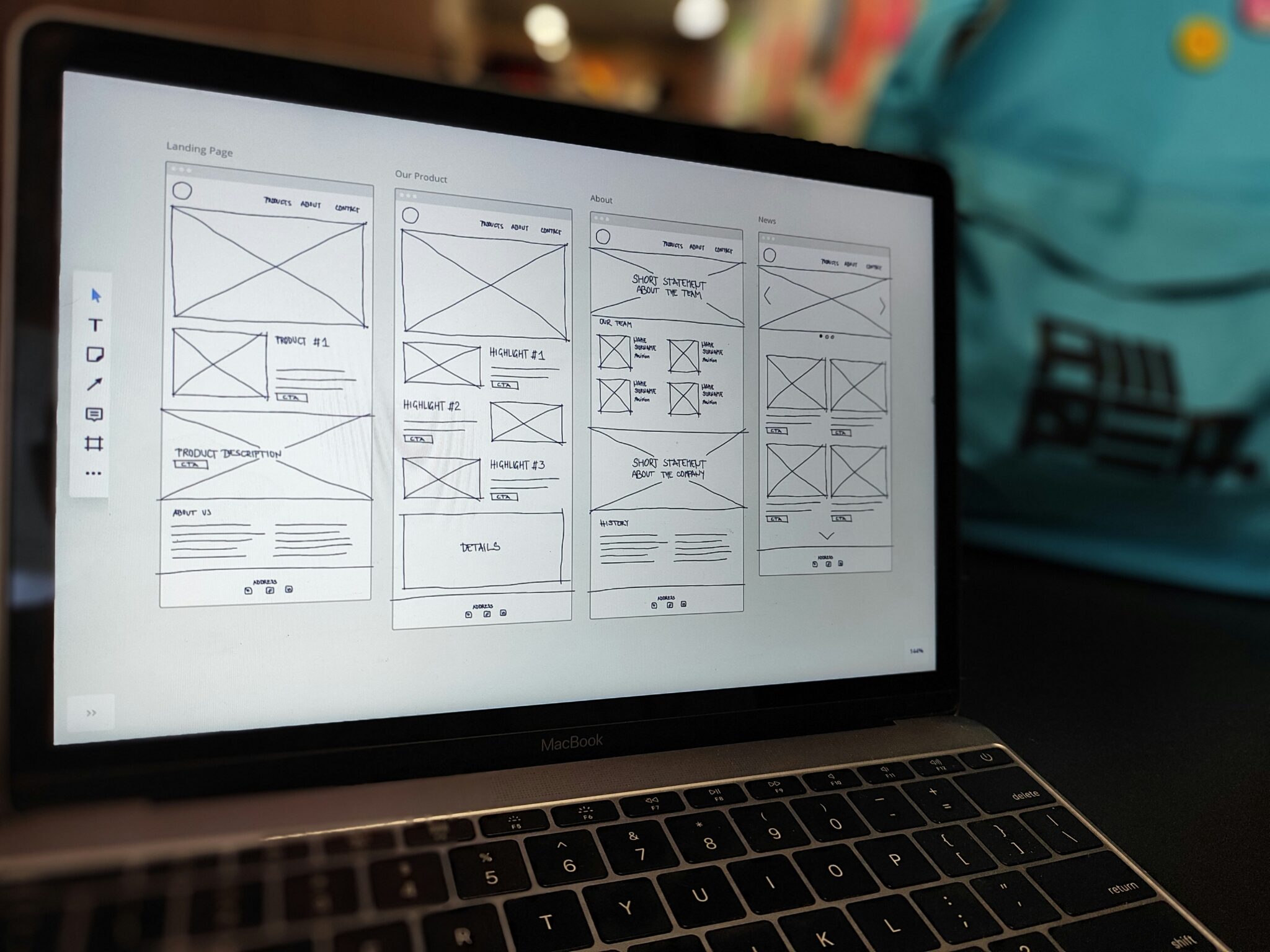Let’s take a look at the quantitative research involving the skills, education, and requirements employers are looking for when hiring UX professionals. Then we’ll end on a high note with an interview with Mission Data’s very own VP of Design Operations, who provides insights into how we find top talent.
AVAILABLE UX ROLES
What roles exist for UX professionals at the moment? Well, you may be surprised to find out that one study from 2019 found there to be 134 unique titles related to User Experience. The top four being UX designer, UX Researcher, Product Designer, and UX/UI designer.
UX Professionals Skills
Next, let’s take a look at the skills that UX Professionals have, wish they had, or feel they don’t need/want.
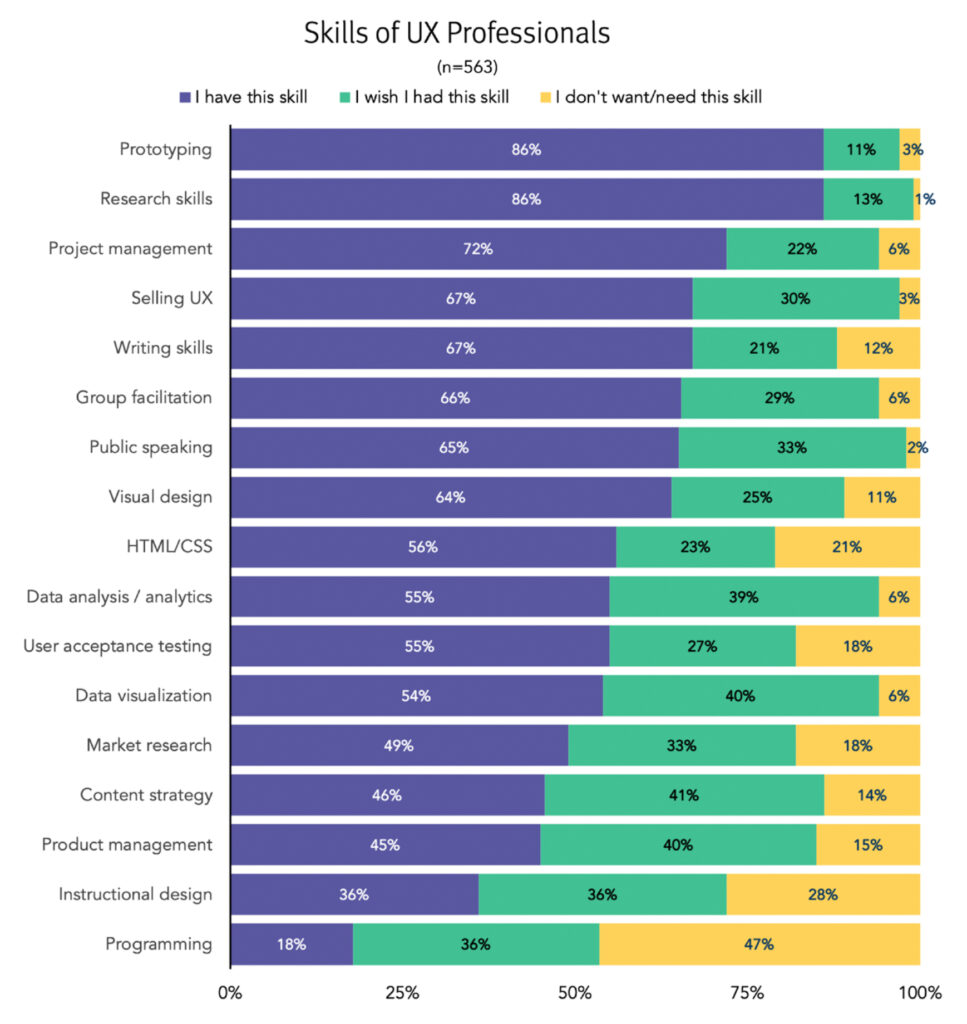
As you can see, prototyping and research are at the top of the list, as expected. Comparatively, UXPlanet “analyzed 68 job postings including positions at the big tech and UX thought-leader companies like Google, Facebook, Microsoft, Amazon, Intercom but also your average tech companies” to determine the skills and services employers are looking for.
You’ll notice that over 90% of companies are looking for familiarity with prominent methodologies, communication, process management, and collaboration.
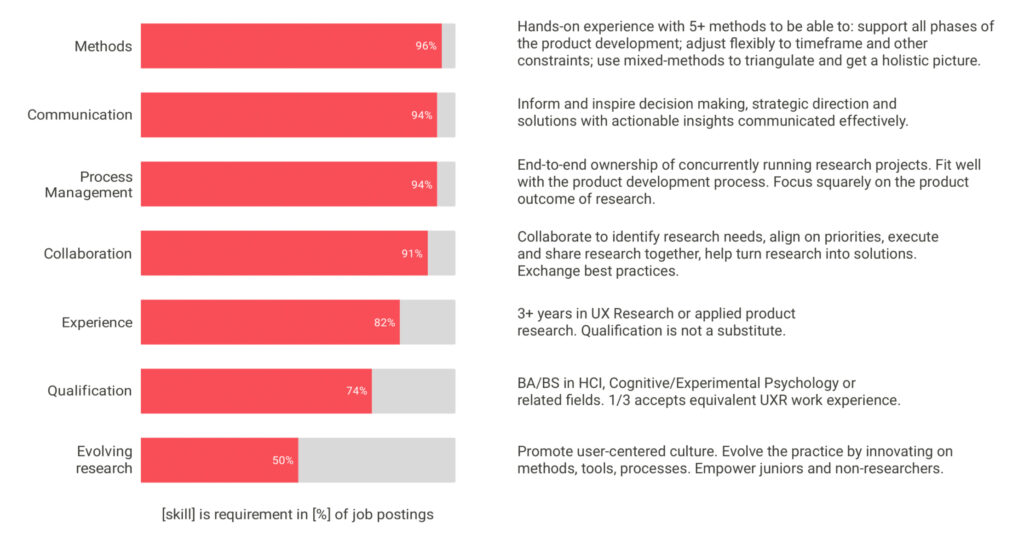
The author takes it one step further, to spell out the most desired research methods.
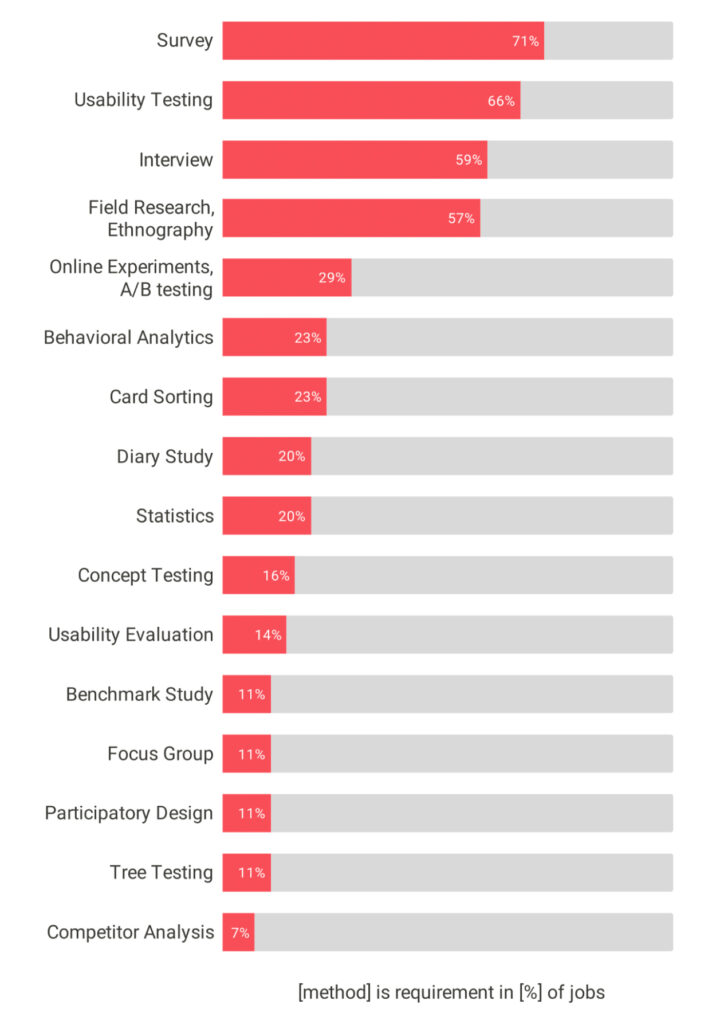
UX Designer Education
In the past, most user experience designers had acquired a bachelor’s degree, with only a few earning a higher education or none at all. While a bachelor’s degree remains the most prominent (still at 82% in 2019), in recent years bootcamps, apprenticeships, and online workshops have risen in both popularity and credibility.
“There’s not going to be a career path like law or medicine where you do X, you do Y, you do Z, you end up here. It’s really up to you … to really form your education, and that education can be formal, informal.”
– NNGroup 2019 Survey Participant
Of the 68 jobs analyzed by UXPlanet, 40% were available without any formal education, while 60% still required at least a BA/BS in Human Computer Interaction, Cognitive Psychology, or related field. However, of all the job postings that require a degree, 34% would accept equivalent work experience.
Okay, so some employers might desire some level of formal education, but how helpful do professionals find their education? In NNGroup’s 2019 study, they asked survey respondents to tell them which topics or subjects in their education have been the most useful for them. “Not surprisingly, there was a huge array of topics mentioned that covered everything from research through to design and project management.” Topics mentioned included:
• Agile project management
• Design thinking
• Human factors
• Information architecture
• Presentation skills
• Prototyping
• Psychology
• Research methods
• Study design
Should UX Designers Code?
You can’t have the education/skills conversation without discussing whether coding is a necessary skill for designers. Everyone has an opinion on the subject, but not everyone agrees.
“Writing front-end and back-end code [was the most useful skill in my UX Career]. This allowed me to understand constraints on functionality ideas, as I knew the obstacles that engineering would have to go through to execute a design. Knowing these obstacles, I was able to meet engineers halfway to get the design across in a way they could still implement it.”
– NNGroup 2019 Survey Participant
According to the data, only 25% of UX practitioners can write software (NNGroup). That being said, just over 50% of their respondents could write some HTML and CSS. “Almost all UX practitioners have skills in research and prototyping. The skill that was least represented was programming, which was also the 4th most desired skill and the skill that most UX practitioners reported to not need. This is interesting, and is perhaps indicative of the disagreement over whether programming skills are useful in a career in UX”
DESIGN PORTFOLIOS
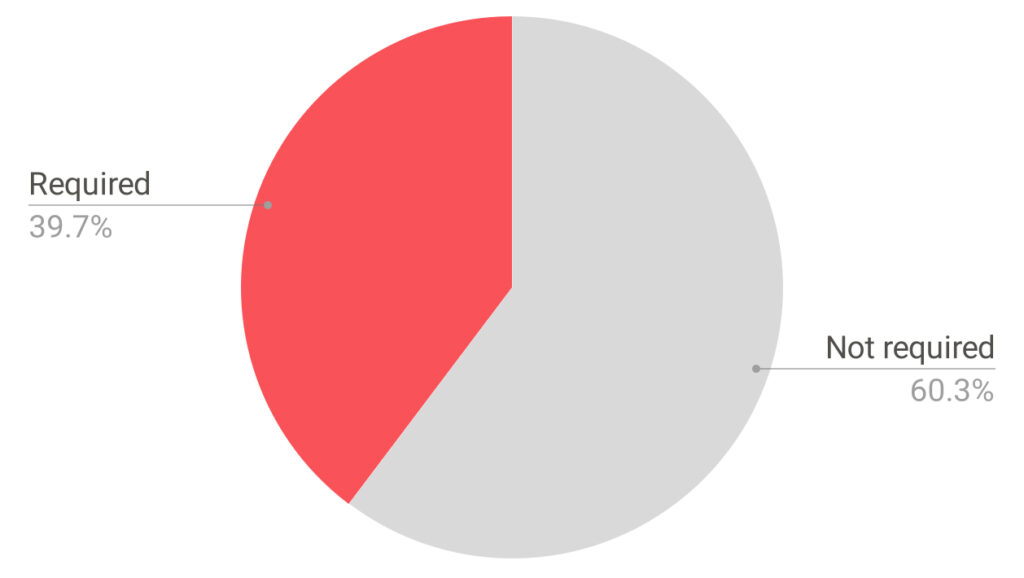
I’ll be honest that only 40% of job listings requiring a portfolio surprised me. In my career, I’ve always been asked for samples of my work when applying for positions, and so have all my colleagues I’ve talked to, so I would have thought that number would be much higher. Even still, I would personally recommend a UX designer have and maintain a portfolio.
With that being said, I don’t think that means you have to design and build your own website and provide samples for every single design you’ve ever worked on. There are some employers that might be impressed with a self-hosted website, but sites like Behance, Dribbble, and similar are fine alternatives. I would advise selecting your favorites projects, as well as ones that represent a particular type of work such as mobile, SaaS, etc to show the variety of problems you’ve solved, and always provide some context and methodology to how you solved it. We’ll see later in an interview with our VP of Design if he agrees!
DESIGN ASSIGNMENTS
Ask any professional who’s been in design for a while about design tests, and be prepared for an earful. Seems like we’ve all had a bad experience with them one way or another. Michal Lenok, Jeff Muller, and Isabela Carvalho all have great articles on their personal experiences with them. I share their consensus which is basically that employers need to get better at vetting designers in the interview process without the need for an assessment. Also, if you are going to request a candidate to take a test, then what you’re asking should be clearly defined and not require hours of free work.
Isabela brought up a great point that an assessment seems more appropriate for a junior designer with few work samples and experience over a seasoned designer. Ultimately if you’re an employer reading this, be careful how you approach a design assessment. They can turn off great candidates, and at the moment, with the high demand for talent, you need them more than they need you.
INTERVIEW WITH MISSION DATA’S VP OF DESIGN OPS

Q: Why don’t you start by introducing yourself.
“I’m Todd Budnikas and I started at Mission Data over 16 years ago as a Macromedia Flash designer. Over the years I grew into different roles including Senior Designer and Creative Director. I most recently changed my title to VP of Design Operations to more closely align with my role overseeing our front-end team of designers and developers. I’ve been involved in hiring for nearly the entire time I’ve been with the company but played a much more important role in that process over the past 10 years.”
Q: What do you look for in a potential UX Designer?
“It’s quite a long list, but I’ll try to mention a few in no particular order:
• A strong passion for improving user experience for end users
• Great communication skills and interest in talking to people and learning about their needs and their business
• A solid understanding of how websites and applications work and at least a sense of what goes into building them
• A good collaborator and someone who values the opinions of others
• An opinionated approach to design”
Q: What criteria do you use to filter candidates to select who you’ll interview?
“When we open a job posting we often get a flood of responses and candidates.
An email or communication that is well written, without grammatical errors and that shows you actually spent time looking at our company goes a long way. And while I know UX design != UI design, a well designed resume tells me time and consideration was taken on presentation and the candidate is doing what they can to look their best. It’s a reflection to me of what their final presentation will be for our customers.
From there it comes down to a portfolio/website and what’s in their resume that determines if we’ll take the time to talk to them and learn more.”
Q: How important are things like their years experience, skills, education, and work samples/portfolio? Etc
“Work experiences and proof of what you can do and what you have done outweigh years of experience and certainly education. In fact we have no education requirements when looking for UX designers. Portfolios aren’t critical but they get a candidate one step closer to an interview because I can look at what they’ve done before talking to them and if the work is good that gives me confidence that coupled with a good resume, they are worth talking to.”
Q: Do you require candidates to complete a design assessment? Why or Why not?
“No, I have never personally done that. Because I expect to see examples of work and/or have talked through the candidate’s process I feel like I should have a pretty good idea of their work product after having a formal interview. If I walk away from that without a clear sense of how this person can fit into the role at our company I don’t think a design assessment/exercise is going to make that clearer. I also value the time of others and don’t feel the need to give people homework to prove themselves.”
Q: What advice would you give someone applying for a UX role at Mission Data, or similar company?
“Show us you are interested in working for our company specifically and come prepared to explain what you can do, what you are passionate about and what you have done. Prove by whatever means you feel necessary that you can help our customers and their products better serve the people who use them.”
